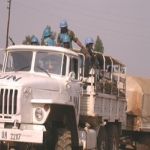
Concerted efforts by MONUC's DDRRR personnel and peacekeepers have contributed to a significant rise in surrenders and voluntary repatriation of FDLR combatants and dependents. UNHCR has also registered a steady rise in Rwandan refugees seeking to return home. As of 23 September, since the beginning of 2009 UNHCR has repatriated 10,841 Rwandan refugees while MONUC's DDR/RR section has demobilized and repatriated 1,048 Rwandan FDLR ex-combatants and 1,583 civilian dependents. The DDR/RR total represents a 233% increase over the repatriation rate of FDLR combatants for the same period in 2008.
DDR/RR's progress has been due to a combination of deep-field deployments to 25 locations and multiple sensitization techniques including face-to-face contact with FDLR commanders, mobile radio broadcasts, direct telephone contacts and leaflet air-drops.
DDRRR's mobile radio broadcasts reach both FDLR combatants and communities where they are present within a modest radius of DDRRR positions. Direct telephone contact with commanders and common soldiers, as well as leaflets dropped on known FDLR positions inform FDLR combatants and their dependents of the option of voluntary repatriation and help persuade them to abandon hard-line leaders and a hopeless future in the bush.
Perhaps the most important technique is the establishment of DDRRR positions with MONUC military detachments that provide protection. The safety and security provided by these military along with messages passed by DDRRR officers help give confidence to those who wish to break out of the clutches of their commanders that they --- and their families --- can get out safely. The presence of peacekeepers and transport provided by MONUC (often by helicopter) contributes to this reassurance and results in an often-overlooked successful MONUC team effort.
The military pressure created by Kimia II military operations conducted by the FARDC aid in this effort to some extent. MONUC's DDR/RR network [reaches into the heart of FDLR encampments with UN military and FDLR military police whose aim it is to discourage and impede desertions while DDR/RR sensitization efforts push on. Sustainability of FARDC operations and continued adaptability, flexibility and maneuverability of MONUC DDRRR, military and logistics are all-important factors in maintaining intensity and effectiveness of disarmament and repatriation operations.
Despite the progress made this year, sensitization and repatriation efforts are made more difficult by the influence exerted by FDLR leaders abroad. FDLR leaders abroad who operate freely and without impunity continue to live comfortably abroad while communicating with desperate FDLR combatants on the ground in the DRC. These so-called leaders play a negative role by directing those engaged in a range of criminal activities, including illegal possession of arms, extortion, murder, rape and recruitment of child soldiers – crimes recognized as crimes against humanity.
Related articles
- • Tshisekedi Announces Government of National Unity and Calls for Unity Against M23 Rebels (February 23, 2025)
- • UN Security Council Calls on Rwanda to Stop Supporting M23 Rebels in DR Congo (February 22, 2025)
- • DR Congo Citizens Head to Polls to Elect President, Members of Parliament (December 20, 2023)
- • Jean-Pierre Bemba Returns to DR Congo (August 1, 2018)
- • At least 30 dead after massacres in Ituri (March 2, 2018)
- • Botswana Urges Joseph Kabila to Step Down (February 26, 2018)
- • No elections in DR Congo in December without electronic voting machines: INEC (February 13, 2018)
- • DR Congo reach final of African Nations Championship (February 3, 2016)
- • Peacekeepers, Congo Army to Resume Joint Fight Against Rwandan Rebels (January 28, 2016)
- • Political tensions 'running high' in DR Congo ahead of 2016 elections (October 7, 2015)
- • DRC Army Putting Pressure on FDLR (April 1, 2015)
- • Police Open Fire on Crowd Protesting Election Law Change (January 19, 2015)
- • Southern African Leaders to Meet in Zimbabwe (August 15, 2014)
- • 15 dead in football match stampede in Kinshasa (May 12, 2014)
- • Kerry Calls on Kabila to Honor Constitution (May 4, 2014)
- • Security Council extends UN mission, intervention force in DR Congo for one year (March 28, 2014)
- • Death toll in Lake Albert boat accident rises to 108 people (March 24, 2014)
- • New DR Congo amnesty law welcomed by UN envoys (February 5, 2014)
- • Colonel Mamadou Ndala Is Killed in Ambush (January 2, 2014)
- • No 'Peace Deal' With Defeated M23 Rebels, DR Congo Says (November 11, 2013)
- • Congo Will Not Sign a 'Peace Deal' With Defeated M23 Rebels, Government Says (November 6, 2013)
- • Congo Army Takes Control of Mbuzi Hill From M23 Rebels (November 4, 2013)
- • Kabila Congratulates Congo Army for Defeating M23 Rebels (October 30, 2013)
- • Advancing Congo Troops Take Control of Rumangabo From M23 Rebels (October 28, 2013)
- • Congo Army Liberates Rutshuru, Kiwanja and Kibumba From M23 Rebels (October 27, 2013)
- • Congo Army Dislodges M23 Rebels From Strategic Town of Kibumba (October 26, 2013)
- • Ban Ki-moon Confirms M23 Rebels Shelled Rwanda (August 31, 2013)
- • DR Congo Will Defend Itself Against an Attack by Rwanda, Government Says (August 31, 2013)
- • M23 Rebels Fired Shells Into Rwanda, Not Congo Army, UN Says (August 30, 2013)
- • Mortar Shells From Rwanda Kill Civilians in Eastern Congo (August 23, 2013)
Tags: |







